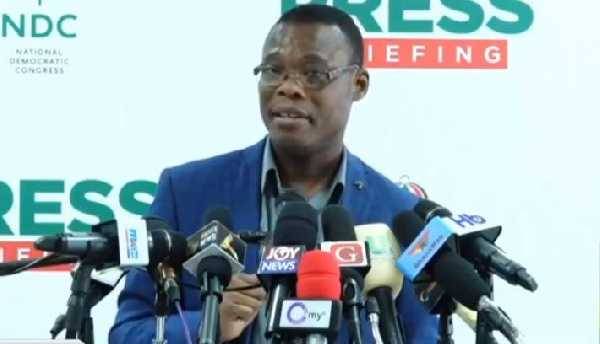The General Secretary of the National Democratic Congress (NDC), Fifi Kwetey, has issued a stern warning to those involved in electoral malpractices, stressing that such crimes will not go unpunished. In a recent statement posted on X (formerly Twitter), Kwetey made it clear that accountability for election-related offenses would be pursued vigorously after the transition of power on January 7, 2025.
"Electoral crimes have no expiry date. After January 7, the time of reckoning will come," Kwetey wrote in the post, signaling the NDC’s intent to hold accountable anyone found guilty of election irregularities. The remarks come amidst the ongoing re-collation of results for nine disputed constituencies in the country.
Kwetey’s warning comes at a time of heightened tension and scrutiny in Ghana's electoral process. The Electoral Commission (EC) has been working to re-collate and announce the results for constituencies where discrepancies were reported after the December 2024 general election. The re-collation exercise, which began following legal challenges and the ordering of a recount by the High Court, has been a focal point for political parties, particularly the NDC.
So far, the EC has successfully re-collated and declared results for seven of the nine contested constituencies. All the declared results have favored the ruling New Patriotic Party (NPP), leading to further discontent and accusations of foul play by the NDC. The constituencies in question include Ahafo Ano North, Techiman South, Ahafo Ano South West, Nsawam Adoagyiri, Obuasi East, Okaikwei Central, and Tema Central. In each of these constituencies, the NPP candidates were confirmed as the winners following the re-collation process.
Kwetey's comments reflect the NDC's dissatisfaction with the current state of the electoral process and their ongoing commitment to ensuring justice is served for what they perceive as electoral malpractices. The NDC has consistently raised concerns about the fairness and transparency of the election results, particularly regarding the handling of the collation process in several constituencies. The party has expressed doubts about the integrity of the EC's procedures, with Kwetey’s post further indicating that the NDC intends to continue to challenge the outcomes and pursue legal avenues to address any perceived injustices.
The NDC’s reaction is part of a broader political struggle in the aftermath of the election, which has been marred by controversy and legal challenges. The party has contested the outcome of the election in several constituencies, alleging that the EC failed to follow proper procedures in the collation and declaration of results. The NDC has also accused the EC of bias and irregularities, which they claim have undermined the credibility of the election results.
In addition to these disputes, the NDC has pointed to the role of security forces during the election period, accusing them of interfering with the electoral process in favor of the ruling party. Kwetey’s statement underscores the party's commitment to ensuring that those responsible for any form of election-related misconduct are held accountable, regardless of when the offenses took place.
The timing of Kwetey’s warning, just weeks before the presidential inauguration on January 7, adds an extra layer of significance to the NDC's message. The party is clearly positioning itself to be vigilant in holding the EC, the ruling party, and any other actors involved in electoral malpractice accountable. Kwetey’s statement suggests that the NDC is prepared to continue its legal and political fight, even after the election results have been officially declared and the new government is sworn in.
The NDC’s call for accountability has resonated with some segments of the public who have raised concerns about the fairness of the election. However, the ruling NPP has dismissed these claims, arguing that the election was free, fair, and transparent. The NPP has also defended the actions of the EC, which it claims has acted impartially throughout the electoral process.
The Electoral Commission, for its part, has defended its handling of the election and the subsequent re-collation process. Despite facing heavy scrutiny from the NDC and other political observers, the EC has maintained that it is carrying out its constitutional duty to ensure that the results are accurate and reflect the will of the people. The EC has also emphasized its commitment to transparency and has urged all parties involved to respect the process.
As Ghana moves closer to the presidential transition in January 2025, the political landscape remains charged with tension, particularly as the NDC continues to challenge the election results. Fifi Kwetey’s statement is just one example of the party's resolve to pursue justice and hold those involved in electoral wrongdoing accountable.
Looking ahead, it seems likely that the political discourse will continue to revolve around the legitimacy of the election results and the actions of the EC. The NDC's vow to pursue electoral crimes, regardless of when they occurred, signals that the party intends to remain active in the political arena and will not back down from its fight for what it believes is a fairer electoral process.
In conclusion, Fifi Kwetey’s recent statement serves as a reminder that the aftermath of an election is often marked by intense political scrutiny and legal challenges. As Ghana approaches a new phase in its political journey, it remains to be seen how the ongoing disputes over the election results will play out, but one thing is clear: the NDC is determined to ensure that any electoral malpractices are addressed, no matter how long it takes.




No comments yet
Be the first to share your thoughts!